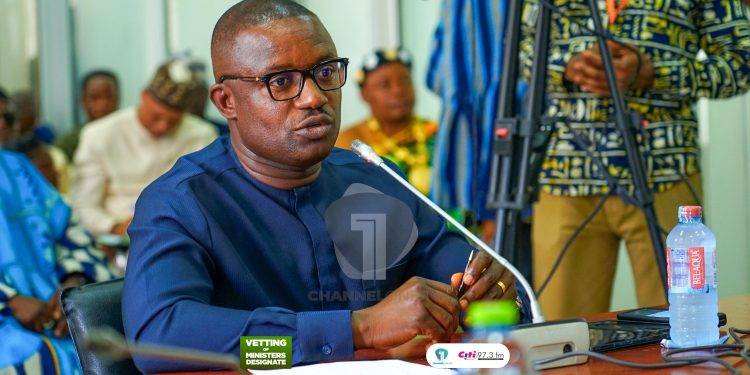The Electricity Company of Ghana (ECG) has come under scrutiny following revelations of significant revenue leakages, amounting to over GHC400 million each month. The Energy Minister-designate, John Jinapor, disclosed this alarming situation during his vetting before Parliament’s Appointments Committee on January 13, 2025.
Jinapor’s revelations painted a troubling picture of inefficiencies and contractual mismanagement within ECG, which collects approximately GHC1.3 billion monthly but fails to account for a substantial portion of these funds. This shortfall has sparked public concern and calls for immediate action to address the lapses in the company’s operations.
Revenue Leakages Exposed
According to Jinapor, ECG contributes only between GHC850 million and GHC900 million to the cash waterfall mechanism—a system designed to ensure equitable distribution of revenue across the energy sector. This leaves about GHC400 million unaccounted for, raising questions about the company's financial practices.
"The main problem with ECG is not just the collection or even how they spend or administer what they collect. They collect an average of about GHC1.3 billion every month. Only GHC850 million or GHC900 million goes into the cash waterfall mechanism. What it means is that almost GHC400 million doesn’t find its way into the system," Jinapor stated.
He attributed the issue to a range of factors, including poorly negotiated contracts and inefficiencies in the management of resources.
Containers at Ports Add to the Woes
One of the key points highlighted by Jinapor was the presence of 2,500 containers at Ghana’s ports, which have remained uncleared due to contractual mismanagement. These containers, he explained, are part of contracts worth GHC9 billion that ECG has entered into, further compounding the company’s financial troubles.
"The containers are sitting at the ports, and demurrage alone is GHC1.2 billion," Jinapor revealed. "Beyond the collection, we also have to drill down on efficiency and ensure that they stick to the cash waterfall mechanism."
The staggering cost of demurrage has raised eyebrows, with experts questioning how ECG could allow such significant waste of resources.
Inefficiencies in Contractual Agreements
Jinapor’s comments also shed light on the broader issue of inefficient contracts within ECG. He pointed out that the company’s tendency to sign numerous and often poorly managed contracts has led to its current financial challenges. These contracts, he argued, have diverted funds away from critical operations and contributed to the shortfall in revenue allocations.
"We must focus on renegotiating these contracts and ensuring value for money," Jinapor emphasized. "Without addressing these issues, the financial sustainability of ECG will remain at risk."
Implications for Ghana’s Energy Sector
The revelations have significant implications for Ghana’s energy sector, which relies heavily on the cash waterfall mechanism for equitable revenue distribution. The mechanism ensures that funds collected by ECG are shared among power producers, distributors, and other stakeholders to maintain a stable energy supply chain.
The missing GHC400 million, however, represents a critical gap that undermines the system’s effectiveness and raises concerns about the sustainability of energy services in the country.
Energy analysts have warned that if these leakages are not addressed, they could lead to higher tariffs for consumers, as the government and ECG attempt to recover lost revenue.
Calls for Accountability
The disclosures have prompted widespread calls for accountability and transparency within ECG. Civil society organizations, industry experts, and ordinary Ghanaians have urged the government to take swift action to address the inefficiencies and recover the missing funds.
"ECG must be held accountable for its financial practices," said Dr. Kwame Adu, an energy economist. "The government should conduct a thorough audit of the company’s operations to identify the root causes of these leakages and implement measures to prevent them in the future."
Dr. Adu also stressed the importance of improving contract management within ECG, noting that poorly negotiated agreements have been a recurring problem for the company.
Potential Privatization
The revelations come amid discussions about the potential privatization of ECG, a move that has been both supported and opposed by various stakeholders. Proponents argue that privatization could improve efficiency and accountability within the company, while critics fear it could lead to higher costs for consumers.
During his vetting, Jinapor hinted at the possibility of revisiting the idea of privatization as part of broader reforms to address ECG’s challenges. However, he emphasized the need for careful consideration to ensure that any such move benefits Ghanaians.
The Way Forward
Jinapor’s comments have reignited debates about the need for comprehensive reforms in Ghana’s energy sector. He proposed a multi-pronged approach to address the issues within ECG, including renegotiating contracts, improving efficiency, and enhancing compliance with the cash waterfall mechanism.
"We cannot afford to let ECG continue operating in this manner," he said. "The company must prioritize efficiency and transparency to restore public confidence and ensure the sustainability of our energy sector."
Public Reactions
The revelations have sparked mixed reactions among Ghanaians, with many expressing frustration over the state of ECG’s operations. Social media platforms have been flooded with calls for immediate reforms and accountability.
"This is unacceptable. How can GHC400 million just go missing every month? The government must act now," one Twitter user wrote.
Others have expressed concern about the potential impact on energy services, particularly for low-income households that are already struggling with high electricity tariffs.
"We need answers and solutions, not just excuses. This is about the future of our energy sector," said a resident of Accra.
Government’s Response
The government has yet to issue an official statement on the revelations, but insiders suggest that a comprehensive review of ECG’s operations is underway. The outcome of this review will likely determine the next steps in addressing the company’s challenges.
For now, all eyes are on the Energy Ministry and ECG as Ghanaians await concrete actions to resolve the revenue leakages and restore confidence in the country’s energy sector. The coming weeks will be critical in shaping the future of ECG and its role in powering Ghana’s development.




No comments yet
Be the first to share your thoughts!